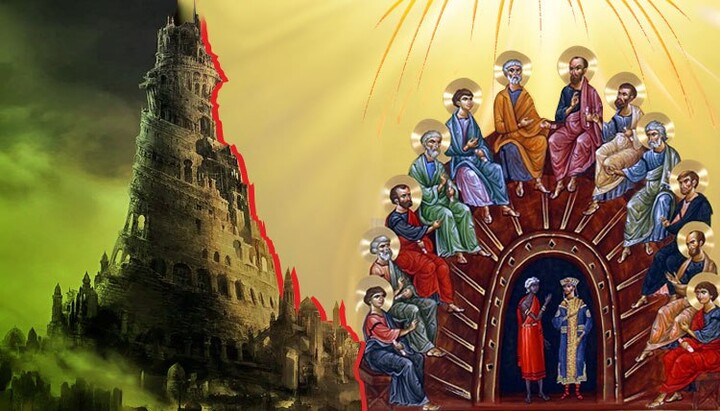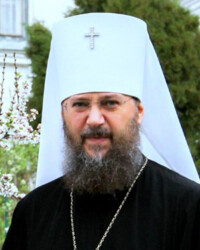Autocephaly: Babel and Pentecost

Where autocephaly ceases to be a spiritual and canonical instrument and turns instead into a political or nationalist project, spiritual chaos arises – similar to the situation at Babel.
The Chancellor of the UOC, Metropolitan Anthony of Boryspil and Brovary, in an article submitted to the UOJ editorial office, proposes to consider the subject of autocephaly through the prism of two biblical events – the destruction of the Tower of Babel and the descent of the Holy Spirit upon the apostles.
We publish the hierarch’s text without edits or alterations.
The question of Church unity and autocephaly has never been simple and has always required from the faithful deep theological reflection. The history of the Church teaches that the true strength of God’s people lies not in administrative structures or political guarantees, but in fidelity to the Gospel and unity in Christ. Every striving for independence must be evaluated not from the standpoint of earthly interests, but in the light of salvation and conciliarity. Wherever the Church seeks the grace of the Holy Spirit, she grows in unity; wherever human pride and national passions prevail, division and spiritual desolation arise.
That is why the comparison of the biblical images of Babel and Pentecost becomes an important key for us: it helps us to discern when the striving for autocephaly can be a blessing, and when – a danger.
Both biblical episodes carry symbolic significance for understanding unity and division in the Church. Their comparison with autocephaly and ecclesiastical unity allows us to assess these processes in the light of Scripture and patristic tradition.
At Babel, men desired “to build themselves a city and a tower with its top in the heavens” – that is, to exalt themselves above God and create an independent system.
St. John Chrysostom remarks: “Pride begets discord, and whoever wishes to act according to his own reason inevitably is scattered.”
In a similar way, in the history of the Orthodox Church we observe a tendency toward division through the pursuit of autocephaly or through excessive emphasis on national or political interests.
Where autocephaly turns from a spiritual and canonical instrument into a political or nationalist project, spiritual chaos arises, like that at Babel.
After the Flood, humanity was united by nature, but through pride and the striving for self-sufficiency it was divided into nations. In the Church, similar division arises when autocephaly becomes the cause of conflicts along national, political, or linguistic lines, rather than serving the unity of faith.
St. Theophan the Recluse warns: “When the Church becomes hostage to earthly passions, she loses grace and ceases to be the Body of Christ.” This principle is especially evident in the example of Ukraine, where in the 20th century autocephalous movements were often supported by state or occupying powers seeking to divide the people spiritually and politically.
The holy Apostle Paul emphasizes that any division in the Church is a spiritual threat: “For as many of you as were baptized into Christ have put on Christ. There is neither Jew nor Greek; there is neither bond nor free… you are all one in Christ Jesus” (Gal. 3:27–28).
St. Cyprian of Carthage writes: “The one Church is spread throughout the world, yet she preserves unity in her source. Whoever seeks to divide her according to flesh or territory loses salvation.”
Thus, any political or nationalist foundation for autocephaly that places earthly interests above the will of God leads to spiritual confusion akin to Babel.
Just as at Babel pride and the striving for autonomy led to the division of nations, so in the Church division on the basis of autocephaly – when supported by politics or nationalism – leads to the loss of conciliarity and grace. Unity in Christ is eternal and indivisible, and every attempt to replace it with human interests is perilous.
The chief task of the faithful is to preserve the unity of the Body of Christ and to perceive autocephaly not as a symbol of political independence, but as a pastoral instrument for growth in faith and salvation.
If autocephaly becomes an end in itself, a way to “make a name” for a particular nation or church group, it may reflect the spirit of Babel, where the unity of the Church gives way to the pursuit of autonomy for the sake of power or prestige. In this way, the striving for autocephaly in the ecclesiastical context can bear resemblance to the confusion at Babel if it is motivated by pride, nationalism, or political ambition, rather than by spiritual goals.
As at Babel the confusion of tongues led to the loss of mutual understanding, so autocephaly, if not grounded in canonical order and conciliarity, can cause a rupture of communion between the Churches.
What episode of Church history can we set against the Babel confusion? First of all, the event that took place on the 50th day after the Resurrection of our Lord Jesus Christ – the day of Pentecost.
This event (Acts 2:1–11) describes the descent of the Holy Spirit upon the apostles, when they began to speak in various tongues – but these tongues united people of different nations in the understanding of the Gospel.
Pentecost is therefore a symbol of ecclesiastical unity, when the Holy Spirit overcomes barriers of language, culture, and nationality, creating the one Church of Christ. And for this reason it is the opposite of Babel’s confusion: instead of division, it brings unity through grace.
The striving for Church unity in the Orthodox context reflects the spirit of Pentecost – when the Church seeks to preserve unity of faith, Eucharistic communion, and love among the Local Churches, regardless of their administrative arrangements.
At Pentecost, different nations heard the Gospel in their own tongue, yet the content was one. Likewise, Church unity does not negate the cultural or national distinctiveness of the Local Churches, but unites them in the common faith.
Did Pentecost end with the close of the Apostolic age? By no means. For the Lord Himself promised to be with His disciples “always, to the end of the age” (Matt. 28:20). The Holy Spirit has not left the Church, but acts within her – including through conciliarity.
The Ecumenical Councils are precisely the organ of Church authority through which the Church together resolved dogmatic and canonical issues. This too is an example of “Pentecostal” unity.
St. Basil the Great explains: “The Holy Spirit grants not only tongue, but also heart, uniting all into one Body of Christ. Where the Spirit is present, there is no division.” This is a striking example of how God’s grace creates unity surpassing the boundaries of nations, languages, and cultures.
At Pentecost, the apostles received the gift of speaking “in other tongues” – not to divide, but to unite people in a common faith. By contrast, division on the grounds of autocephaly or nationalism is a “worldly tower of Babel,” where men seek to exalt themselves by their own efforts and to construct a separate structure, without concern for unity in Christ.
St. Cyprian of Carthage emphasizes: “The Church is one throughout the whole world, and only in unity does she preserve grace; every division leads to spiritual death.”
When autocephaly is used as a political or nationalist instrument, it distances the Church from her spiritual purpose – the salvation of souls and the spread of the Gospel.
At Pentecost, however, the Church showed that true independence and strength come only through the Holy Spirit, rather than human projects or state borders.
St. John Chrysostom writes: “Where love and the spirit of unity are present, nothing human can divide the Church; where pride reigns, schism is inevitable.”
Pentecost, therefore, is a reminder that the Church is called to be the one Body of Christ, united by the Holy Spirit. Any attempt to replace this unity with political, nationalist, or human motives – including the artificial opposition of autocephalies – leads to spiritual confusion and division.
The task of the faithful is to hold fast to unity in Christ, to seek the grace of the Holy Spirit, and not to pursue national or political “autocephalous” divisions. Yes, autocephaly in itself is neither good nor evil. But its value depends solely on whether it serves the unity of the Church, as at Pentecost, or whether – like Babel – it leads to division.












